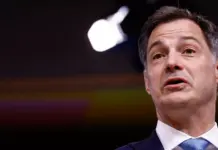
Surrounded by five Commissioners, European Commission president Ursula von der Leyen announced on Monday the launch of a special corona response team to coordinate the work on halting the coronavirus.
Since the outbreak of the coronavirus, the Commission has been questioned by journalists about its measures in containing the virus from spreading in the EU and about what appeared to outsiders as a lack of coordination and transparency.
Yesterday (2 February), the journalists were invited to the Commission’s Emergency Response Coordination Centre (ERCC), the hub of all response activities. The centre works around-the clock in monitoring emergencies and disasters both inside and outside Europe to support a coordinated and rapid response by the Commission.
In this dramatic setting, the von der Leyen assured that the EU has acted from the very beginning of the outbreak in coordinating national measures and in informing the press about its support to the member states.
The virus however continues to spread, she said and referred to the latest update of the risk assessment by the European Centre for Disease Prevention and Control (ECDC). On Monday, the number of reported cases in Europe was 2,199 in 18 countries with 38 deaths (35 in Italy, two in France and one in San Marino). In most countries the number of infected persons is still small.
ECDC announced yesterday that the risk of widespread sustained transmission of the coronavirus in the EU/EEA and UK in the coming weeks is moderate to high, with more countries expected to report more cases and clusters.
The assessment is based is on a number of factors, such as the increasing number of countries with widespread community transmission around the world and in Europe. These are exporting cases with subsequent transmission to previously unaffected areas. The control measures have up to now been able to only slow, but not stop further spread.
Cases with mild symptoms are numerous and able to transmit the infection. These cases are not always aware of their potential infectivity, and some people with mild symptoms have sought medical care, thereby infecting health care workers.
ECDC also warned that in the event of established and widespread community transmission, current containment measures may no longer be an efficient use of resources. “Action should be taken to prepare for a mitigation strategy that includes co-ordinated efforts to protect the health of citizens by decreasing the burden on healthcare systems and protecting populations at risk of severe disease.”
“We all know that there are many, many different actions that are needed to address the coronavirus,” the Commission president said. “We have a situation that is very complex and it requires on the one side, very swift action and on the other side, a strong coordination at all the levels and all the different sectors – not only on the European level but of course on the national level.”
The new corona response team of five commissioners will step up the coordination on halting the spread of the virus. Janez Lenacic will be in charge of crisis management, Stella Kyrikades for health issues, Ylva Johansson for border-related issues, Adina Valean for mobility and Paolo Gentiloni for macroeconomic aspects.
The response team will be working on three main pillars: first, the medical field, covering prevention and procurement to relief measures, information and foresight, in close cooperation with the European Centre for Disease Prevention and Control and the European Medicines Agency.
The second pillar covers mobility, from transport to travel advice and Schengen-related questions. The third pillar covers the economy. It will be looking in-depth at various business sectors – such as tourism or transport, trade, as well as value chains and macro-economy.
Information will also be more accessible by a dedicated webpage on the coronavirus. The website provides information on key activities across medical, civil protection, mobility, economy and statistics angles, as well as links to member states’ dedicated websites, most recent studies and other relevant information.
The Brussels Times









